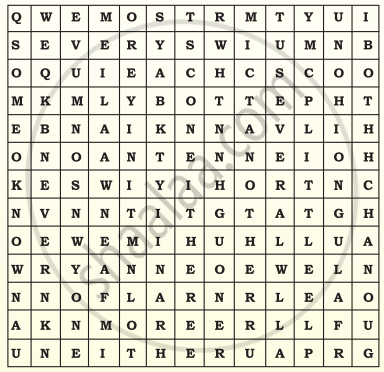Advertisements
Advertisements
प्रश्न
Determiners with countable and uncountable nouns
Now get into groups of four, compare your answers, and decide which of
the determiners can be used with
..................................... countable nouns only
.................................... uncountable nouns only
........................................... both countable and uncountable nouns
Fill in the table below as you do this activity
| Countable (C) | Uncountable (U) | Both (C) and (U) |
| a pen | some water | some pens / some water |
उत्तर
The following determiners can be used with countable nouns only :
a, all, an, another, every, both, each, either, two few, many, several, most, neither, no, any, one
The following determiners can be used with uncountable nouns only :
enough, little, more, a lot of, some, much
The following determiners can be used with both countable and uncountable nouns :
all, some, most, more, a lot of, enough, no, any
| Countable (C) | Uncountable (U) | Both (C) and (U) |
|
some water a little water much water |
some pens / some water any pen/some water enough pen/any water more pens/more water no pen/no water |
APPEARS IN
संबंधित प्रश्न
In this unit you will use the words which help to identify things – to say whether they are known or unknown to the listener, which one(s) the speaker is talking about, whether the speaker is thinking of specific examples or talking in general. You will also work with words which say ‘how much’ or ‘how many’.
There are twenty determiners in the grid given below. Encircle these determiners.

Articles
1. The building that I visited today is a museum.
2. A building in which antiques are kept is called a museum.
Working in pair, decide which of the following items in italics is definite (or specific) and which is indefinite (or non-specific).
Then complete the following sentence using appropriate articles.
- Australia, ................ country in the southern Hemisphere, has produced some world-class sportspersons.
Read the dialogue and fill in the blanks by using words which will help to make the meaning clear.
A. ( 1) ___ two chairs look so shabby. Don't you think we need to get a
(2) ................ of new ones?
B. We'll talk about it a (3)................ later, I have (4) ................important piece of work to complete tonight. I can't spare (5) ................time right now.
A. I saw (6)................ exquisite chair at 'WOODCRAFT'. I think they would fit beautifully in (7) ................drawing-room.
B. WOODCRAFT! It is (8) ................most expensive show-room in town.
A But they have authentic teak furniture, or we could choose (9)................set of chairs in rosewood; (10) ................idea may be to buy some cane chairs. B. I guess it would be useful to spend a ( 11) ................ more on furniture which would last for ( 12) ................years.
A. So, when can you spare a (13)................ hours to visit WOODCRAFf with me?
B. We could go ( 14) ................ Saturday or Sunday.
Choose the appropriate option from the box to complete the given sentence.
l had left _____I [ the/ my] green shirt on the bed, but l can't find it now.
Choose the appropriate option from the box to complete the given sentence.
________[ one/ few/ an ] example helps understand concepts better.
Choose the appropriate option from the box to complete the given sentence.
______[ few/ some ] of the mango trees in their garden bear fruit twice a Year .
Choose the appropriate option from the box to complete the given sentence.
The ______[ many / three ] monkeys that escaped from the Delhi zoo were found eating bananas in a fruit shop.
Choose the appropriate option from the box to complete the given sentence.
I spent _______[ the little / a little ] money I had.
From the following sentence, underline the Noun and encircle their Determiners that specify the noun in a noun phrase.
(articles/possessive pronouns/demonstratives or quantifiers)
That dream made him realize it
